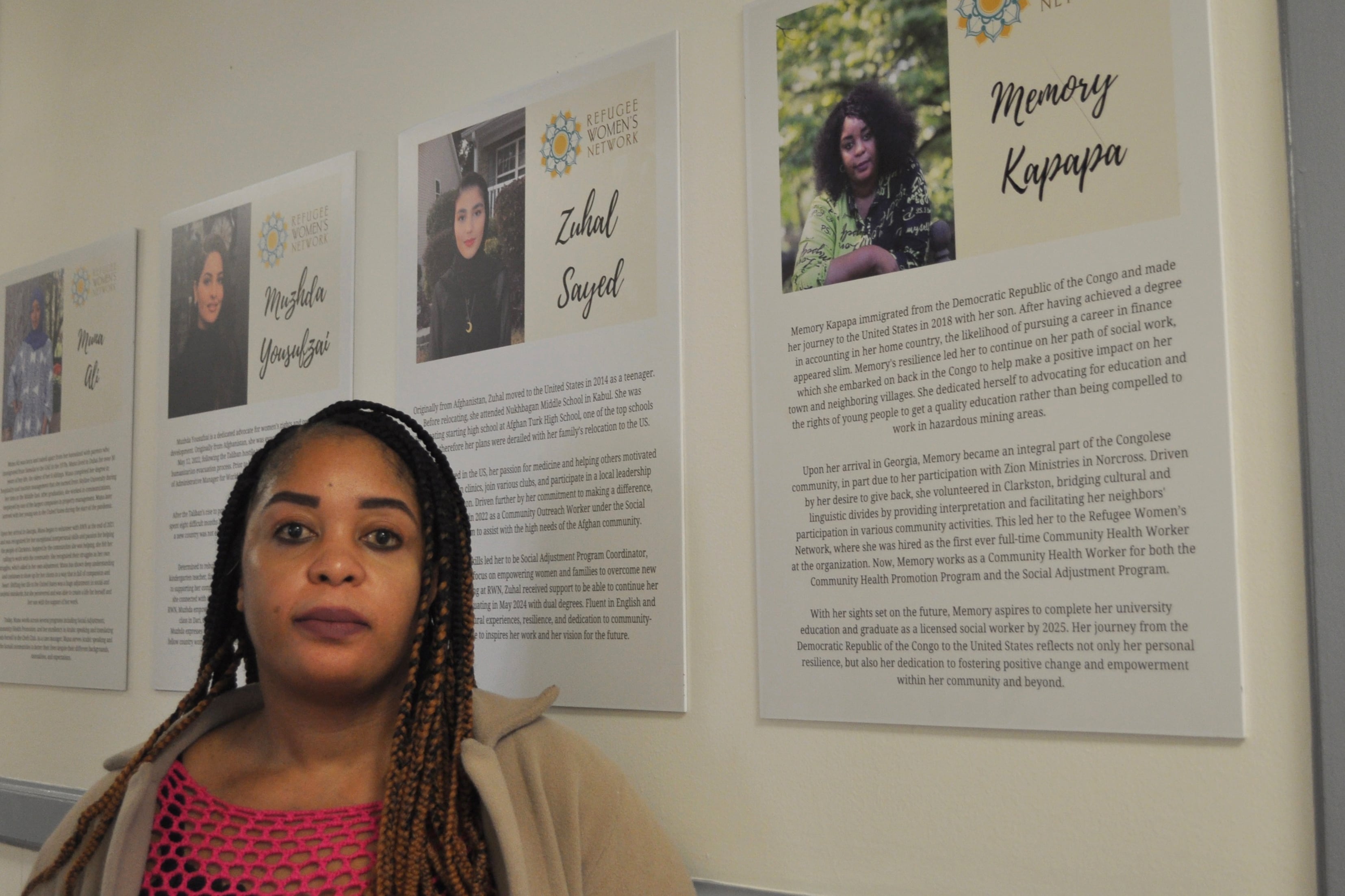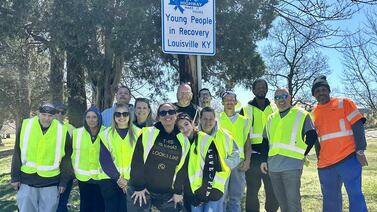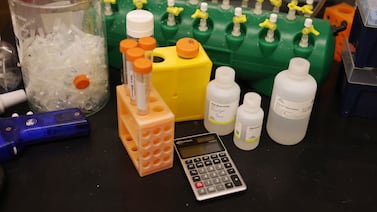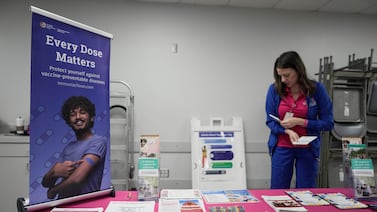Public health, explained: Sign up to receive Healthbeat’s free Atlanta newsletter here.
Memory Kapapa frequently thinks about the nutritional health of metro Atlanta’s refugee community. As a community health worker for Refugee Women’s Network, a DeKalb County nonprofit focused on supporting immigrant women in the region, Kapapa helps manage programs that teach newcomers to the United States how the food they eat impacts their well-being.
The Congolese asylum seeker knows access to nutritious foods can be difficult for immigrants in Georgia. With the high cost of groceries and the precarious financial situation many refugees face when they come to the country, Kapapa said many people she serves struggle to afford foods that help prevent chronic conditions like diabetes and heart disease.
“If I go to buy sweet potato leaves just for myself, I think a pound costs already $12,” she said. “If it already costs me that much, talking about somebody who has a big family, how much money are they going to spend to have vegetables?”
Lately, she’s been focused on iron intake among the young children of the women her organization serves. The nutrient — highly concentrated in foods like animal products, lentils, and leafy greens — is important for babies’ and infants’ development.
Deficiencies can hinder how oxygen circulates in the body, resulting in a condition called iron-deficiency anemia. When that happens, a young child can have trouble breathing and exerting energy, among other health issues.
Researchers have found the children of refugees to be at high risk of iron-deficiency anemia across the United States. And for DeKalb’s refugee community, Kapapa and other health professionals believe this problem might be especially urgent.
Ethnē Health clinic in Clarkston, a Central DeKalb city with one of the highest concentrations of refugee residents in the United States, recently examined how many of its young patients screened positive for anemia at their 12-month and 24-month checkups. The providers there found that about a quarter of them had low oxygen levels, much higher than the estimated 1% to 5% of U.S. young children who have the condition.
The rates of childhood anemia were even higher among some communities served at the Clarkston-based clinic. Among Congolese and Afghan pediatric patients, Ethnē found that about 28% of patients screened positive for anemia.
While not all anemia is caused by iron deficiencies, Dr. Laurie Boden, a co-founder of Ethnē Health and a pediatrician who worked on this analysis, said the mineral is most often responsible for this condition in 12- and 24-month-olds.
Kapapa said Ethnē’s data are reflected by some of the children she sees in the community.
“They don’t look good,” she said. “Some of them do look weak and pale.”
From 2010 to 2020, Dr. Susan Reines worked with the DeKalb Public Health department to treat refugee children who had recently resettled in the metro Atlanta area. Although she saw plenty of anemia among those kids, she said she wouldn’t have expected numbers to be that high among the children of people who have lived in the country for over a year.
Reines, who was not involved with the Ethnē analysis, said new refugees are supposed to go through nutritional education classes within their first few months of being resettled. The classes, part of a federal program designed to help new parents from low-income backgrounds, are intended to prevent nutrition-related health problems like iron-deficiency anemia from reappearing.
“That’s a little bit concerning if these families have truly been here for a long time,” she said.
Boden said she and the clinic’s staff don’t fully understand why this disparity is persisting. But she thinks there are a variety of factors that could help explain it.
Some of it, she said, comes from nutritional classes not being tailored for refugees living in a new country. While newcomers might be given jarred baby food that’s rich in iron, it may not be introduced to them in a culturally appropriate format.
“It’s just not familiar to the refugee population,” she said.
To Kapapa, the novelty of the nutrition plans paired with the financial and acclimation challenges of being a refugee, like language barriers, makes it so many iron-rich resources are out of reach for the mothers she serves.
“It takes a little more than just doing outreach to help somebody who doesn’t have the language,” she said.
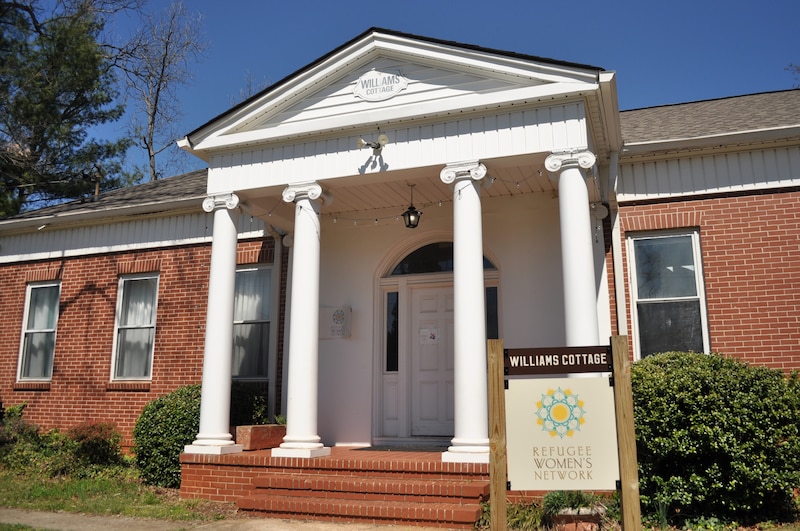
She and Refugee Women’s Network are working on some attempts to address these problems. Through a partnership with some Emory University public health researchers, Kapapa helped conduct focus groups with Congolese mothers to better understand community food challenges and share nutrition education. She said there’s plans for her organization to host similar discussions with Afghan mothers later this year.
Thai Vang, one of the researchers and a master of public health graduate student at the university, said the team is also looking to develop a culturally competent cookbook chalked full of iron-rich recipes that Congolese mothers could make. Dr. Amy Rule, an Emory pediatrician who oversaw Vang’s work on this project, said they’re hoping to have consistent community input as they go about designing the book.
“The idea is that we’re working alongside our community partners, including hopefully some parents, to really be able to actually create something that is really useful,” Rule said.
Kapapa is excited about the cookbook project. She thinks it would pair well with cooking classes that Refugee Women’s Network wants to begin hosting, where mothers could practice making these iron-rich recipes.
But she worries all these efforts could be compromised by efforts by the federal government to roll back some social services. In addition to drastically scaling back refugee-specific resources, President Donald Trump’s administration has moved to cut funding for safety net nutrition services like community food banks —- programs that Kapapa said the mothers she serves often rely on for nutritious foods.
Kapapa wishes that the people making these decisions would consider how refugees use existing federal resources to become self-sufficient, something she said has benefits to everyone in the country.
“Because when people are independent, they’ll learn how to manage themselves.”
Allen Siegler is a reporter covering public health in Atlanta for Healthbeat. Contact Allen at asiegler@healthbeat.org.

